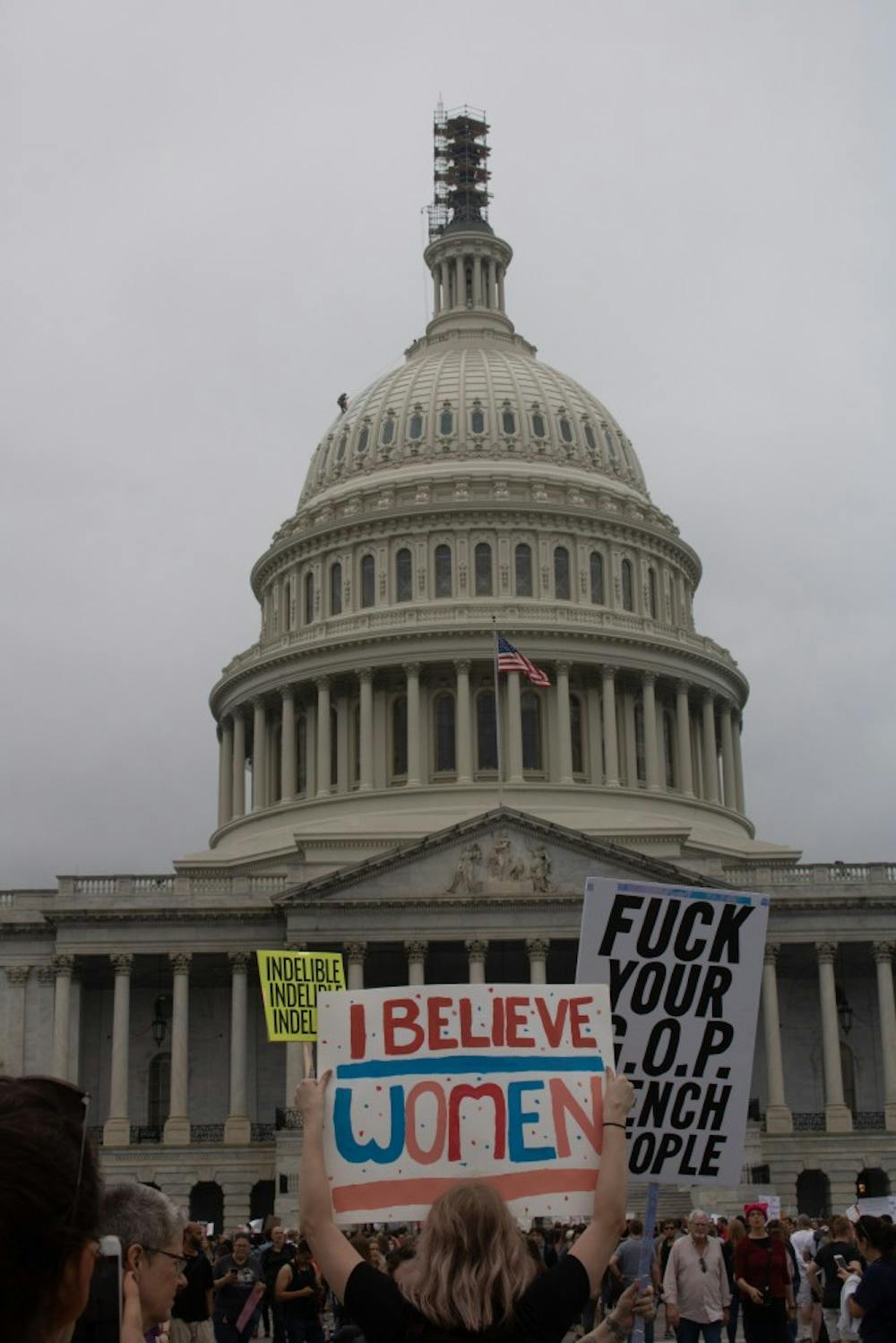Several hundred protestors gathered outside the Capitol Building to express their dissent over Brett Kavanaugh’s confirmation to the Supreme Court on Saturday.
Following his initial confirmation proceedings, Christine Blasey Ford accused Kavanaugh of sexually assaulting her when they were teenagers, casting doubt on his nomination and putting it into a larger national conversation about sexual violence and the #MeToo movement. On Sept. 27, both Blasey Ford and Kavanaugh testified on Capitol Hill.
Despite this, a narrow Senate vote of 50-48 confirmed Kavanaugh as the newest Supreme Court Justice on Saturday, creating a conservative majority on the nation’s highest court. The vote fell mostly along party lines, with only one Democratic senator voting in favor of Kavanaugh’s nomination, and only one Republican senator voting against.
Among those protesting Kavanaugh’s confirmation were Hopkins undergraduates Alex Walinskas and Emma Weinert.
Walinskas, a junior, is spending the semester in Washington, D.C. as part of the Aitchison Public Service Undergraduate Fellowship.
“I figured that I should take advantage of witnessing these really significant moments in history,” she said. “I really wanted to see what the resistance to Kavanaugh looked like and who was out there responding to his confirmation.”
Weinert, a senior, participated in the protest because she was frustrated with how the Ford-Kavanaugh hearings had been handled.
“In my opinion, [Kavanaugh] clearly lied to senators and was extremely partisan and disrespectful of the process as a whole,” she said. “I was incredibly frustrated by that and by the fact that Republicans weren’t doing anything about it.”
Weinert added that she was inspired by how many people came and that even the organizers themselves seemed surprised by the number of protesters in attendance.
Organized by the Women’s March, the protest featured speakers like Senator Elizabeth Warren (D-Mass.), Senator Ed Markey (D-Mass.) and Senator Jeff Merkley (D-Ore.), as well as people from activist organizations fighting against sexual violence.
According to Walinskas, the fact that several Democratic senators spoke caused the protest to take a partisan turn.
“We saw very intense confrontations between pro-Trump people and anti-Trump people. It was just on the verge of being violent. They were on the street, up in each other’s faces,” she said. “That was kind of scary, but on the whole, it was a very peaceful event.”
She added that the themes of the protest centered around the idea that Kavanaugh was unfit to serve on the Supreme Court, not only because of the sexual assault allegations against him but because of his attitude during his testimony.
She felt that survivors of sexual assault should be believed more often, comparing the Ford-Kavanaugh hearing to the hearing surrounding Anita Hill’s 1991 accusations of sexual assault against Supreme Court Justice Clarence Thomas.
“Just the way that Kavanaugh presented himself at the hearing shows that he is unfit to serve,” she said. “We went back to the theme that as a society, we should be believing survivors. Going back to Anita Hill, we should still be believing Anita Hill, we should be believing Dr. Blasey Ford.”
Walinskas felt that in today’s political climate, particularly surrounding the Ford-Kavanaugh hearings, students can not afford to stay silent.
“This is a time where you have to be engaged,” she said. “You can’t just sit passively and watch it go by.”
On the Homewood Campus, the Office of Multicultural Affairs (OMA) held an open session dialogue in the Diversity & Inclusion Lounge for students on Tuesday. It partnered with the Center for Student Health & Wellness (CHEW), the Interfaith Center and the Center for Social Concern (CSC) to invite students to discuss the Ford-Kavanaugh hearing and the national state of gender violence.
OMA staff member Rezwana Zafar emphasized the importance of creating a space where students could process their feelings and engage in meaningful conversations with others. She added that just by attending, students showed their willingness to have such conversations.
“It was a space to create conversation around what people are feeling,” she said.
Sophomore Lana Weidgenant said she was glad that the discussion was able to bring out different perspectives and create engaging conversation.
“I appreciate that some people felt comfortable enough to share viewpoints that maybe aren’t as commonly expressed here,” she said. “To have the Hopkins population also respond to those viewpoints, that was a very constructive environment.”
During the discussion, some students brought up their shock at Kavanaugh’s confirmation, adding that it was frightening to know that he would retain his seat on the Supreme Court for decades to come. Others were afraid that what they perceived as Kavanaugh’s pro-life stance might mean that the Supreme Court could overturn Roe v. Wade, the case that de-criminalized abortion in 1973.
Students added that this Supreme Court fight had become more about politics and partisanship than about humanity, citing that neither the Democratic nor the Republican party wanted the other to gain a majority on the most important court in the country.
For sophomore Leta Ashebo, going to the discussion was an opportunity to challenge herself and broaden her perspectives. Both Ashebo and Weidgenant said that the idea brought up during the discussion of men and women being treated inherently differently in today’s society was particularly striking.
According to Ashebo, the idea of equality versus equity in the way survivors are treated was especially interesting.
“A lot of times, we hear the word equality, and we think that’s enough. But equality doesn’t necessarily even mean equal,” she said. “So realizing equity is what we should be striving for and respect is something that everyone deserves — that’s something that is lacking.”
Alyssa Wooden contributed reporting.

















